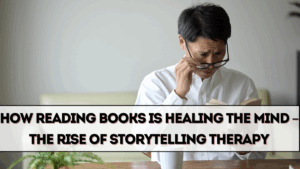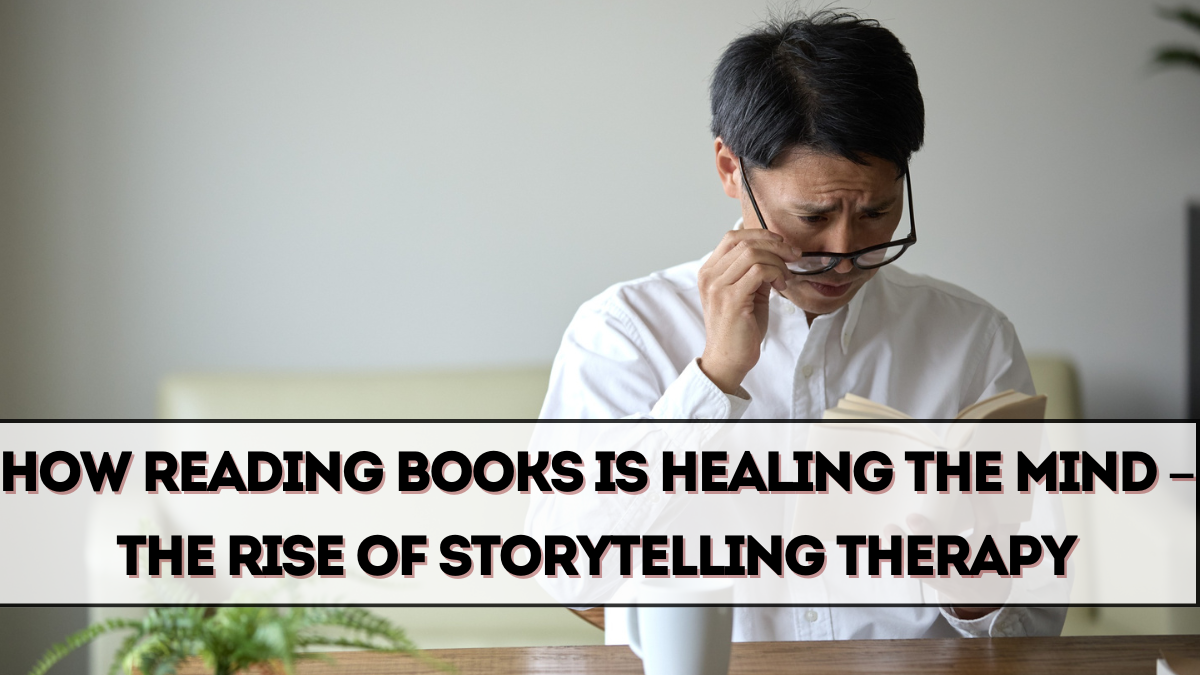Mental health awareness has grown significantly in recent years, with people exploring both traditional and alternative approaches to emotional well-being. Among these methods, storytelling for mental health, also known as bibliotherapy, has emerged as a powerful tool. In 2025, the practice is gaining momentum globally, with psychologists, educators, and wellness advocates recommending books as therapeutic aids to manage stress, anxiety, grief, and even depression.
Far from being a new concept, bibliotherapy has roots in history, but modern studies now validate its ability to provide comfort, perspective, and resilience through the simple act of reading.

What Is Bibliotherapy?
Bibliotherapy refers to the therapeutic use of books and reading materials to promote psychological healing. It involves guided or self-directed reading of fiction, non-fiction, memoirs, and self-help books to help individuals reflect, process emotions, and gain coping strategies.
The therapy can be formal, where mental health professionals prescribe specific books, or informal, where individuals choose literature that resonates with their personal struggles.
Why Storytelling Helps Mental Health
Stories allow readers to immerse themselves in narratives that mirror or contrast their own experiences. Several benefits explain why this method is effective:
-
Emotional Catharsis: Reading about characters facing adversity helps readers release pent-up emotions.
-
Perspective Building: Fiction and memoirs provide new ways of seeing problems, reducing feelings of isolation.
-
Stress Relief: Immersion in storytelling lowers stress levels, similar to meditation.
-
Skill Development: Self-help books provide practical coping mechanisms for everyday challenges.
-
Empathy Growth: Engaging with diverse narratives fosters compassion and self-understanding.
In essence, storytelling acts as both a mirror and a window—reflecting personal struggles and opening doors to new possibilities.
Applications of Bibliotherapy in 2025
The use of storytelling for mental health has expanded in several areas:
-
Clinical Settings: Therapists integrate bibliotherapy alongside counseling and cognitive-behavioral therapy.
-
Education: Schools encourage students to read books tackling themes of resilience, bullying, and self-confidence.
-
Workplace Wellness: Companies include bibliotherapy sessions in employee assistance programs to reduce burnout.
-
Community Programs: Libraries host guided reading groups to support those facing grief or mental illness.
This versatility makes bibliotherapy suitable for diverse populations and age groups.
Popular Genres for Mental Wellness
Different genres support different aspects of mental health:
-
Fiction: Offers escapism, imagination, and emotional connection with characters.
-
Memoirs: Inspire resilience by sharing personal stories of overcoming adversity.
-
Poetry: Encourages emotional release and reflection through concise, powerful expression.
-
Self-Help Books: Provide step-by-step strategies for managing anxiety, depression, and personal growth.
-
Children’s Books: Help young readers process emotions like fear, sadness, or anger in simple ways.
The broad spectrum ensures readers can find the right book for their needs.
Benefits of Storytelling Therapy
The rise of bibliotherapy in 2025 highlights several key benefits:
-
Accessibility: Books are widely available and affordable.
-
Non-Invasive: A gentle, private approach to mental health care.
-
Empowerment: Encourages individuals to take active roles in their healing.
-
Community Building: Reading groups create safe spaces for sharing and support.
-
Complementary Approach: Works alongside medication or therapy without side effects.
These strengths make storytelling therapy one of the most practical tools for everyday mental wellness.
Criticisms and Limitations
Despite its promise, bibliotherapy is not without limitations:
-
Not a Substitute for Professional Help: Severe mental health conditions still require medical intervention.
-
Book Selection Challenges: Without guidance, individuals may struggle to find helpful or relevant material.
-
Cultural Relevance: Books must reflect diverse experiences to resonate with wider populations.
-
Over-Reliance: Some critics worry that individuals may avoid therapy by leaning solely on self-help books.
Balancing bibliotherapy with other mental health practices ensures its effectiveness.
Future of Bibliotherapy
Looking ahead, storytelling for mental health is expected to evolve further:
-
Digital Libraries: Online platforms offering curated bibliotherapy collections.
-
AI Recommendations: Apps suggesting personalized reading lists based on mood and stress levels.
-
Global Outreach: Nonprofits promoting bibliotherapy in developing nations where access to therapy is limited.
-
Integration with Schools: Mental wellness curriculums incorporating storytelling as a standard tool.
These trends point to bibliotherapy becoming a mainstream aspect of global wellness strategies.
FAQs
What is bibliotherapy?
It is the therapeutic use of books to improve mental health, helping individuals process emotions, build resilience, and find coping strategies.
Can reading fiction really reduce stress?
Yes, research shows that reading for just 30 minutes can lower stress levels as effectively as meditation.
Is bibliotherapy suitable for children?
Absolutely, children’s books are widely used to help young readers deal with emotions like fear, sadness, and anger.
Can bibliotherapy replace therapy or medication?
No, it works best as a complementary approach alongside professional treatment when needed.
Click here to know more.
